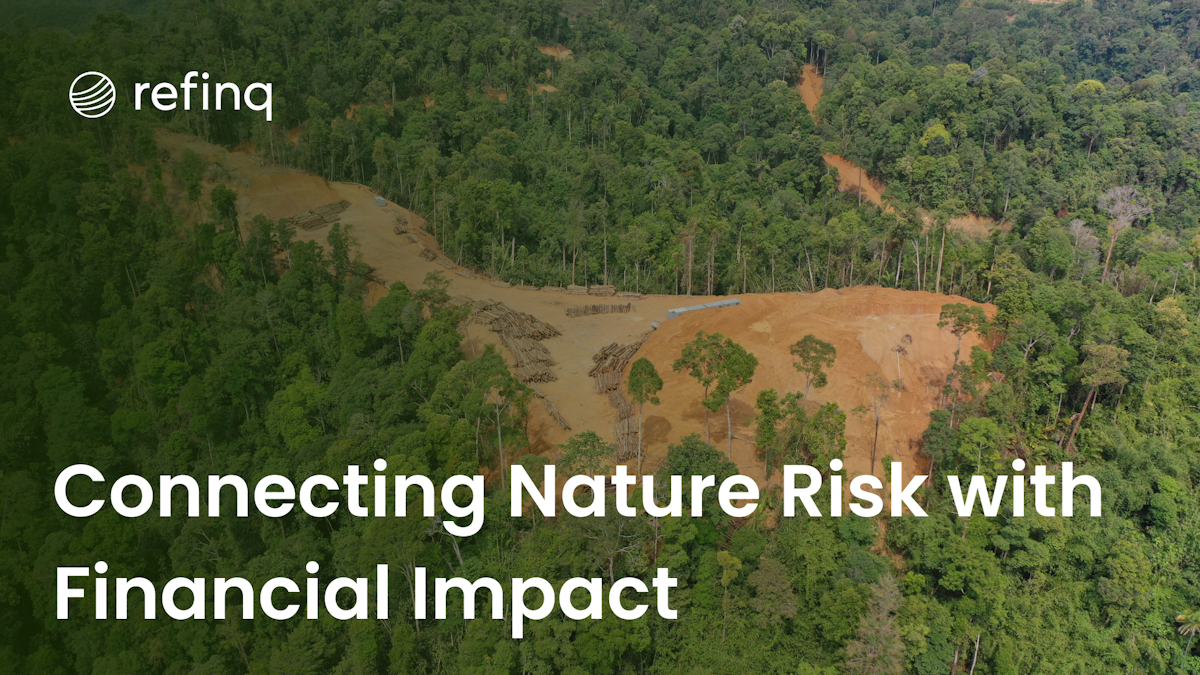Linking Nature Risk to Financial Risk

As businesses and financial institutions increasingly face environmental challenges, understanding the connection between nature risk and financial risk is critical. The degradation of ecosystems, biodiversity loss, and climate change can lead to substantial economic consequences. Tools like refinq, which offer comprehensive environmental risk assessments, are helping businesses address these interconnected risks.
According to the NGFS Conceptual Framework on Nature-Related Risks, disruptions in natural ecosystems can directly impact financial markets by threatening supply chains, increasing insurance claims, and reducing asset value. By integrating nature risk into financial decision-making, businesses can mitigate long-term losses and ensure sustainable growth.
Understanding the Nature-Financial Risk Nexus
What Is Nature Risk?
Nature risk refers to the potential negative impact on businesses and economies resulting from the degradation of ecosystems and biodiversity. These risks are categorized as:
Physical Risks: Caused by natural disasters, resource depletion, and habitat loss.
Transition Risks: Stemming from changes in regulations, market demands, or technologies aimed at addressing environmental challenges.
How Does Nature Risk Influence Financial Stability?
Supply Chain Disruptions: Ecosystem degradation can interrupt the availability of raw materials, affecting production and distribution. For instance, the loss of pollinators can impact agricultural yields, influencing global markets.
Asset Devaluation: Properties and investments reliant on natural resources can lose value as those resources diminish.
Regulatory Pressures: Policies aimed at mitigating environmental risks can impose additional compliance costs on industries.
The IMF's report on embedded nature-related risks highlights that emerging markets are particularly vulnerable to these risks due to their dependence on natural capital.
The Role of Regulators in Addressing Nature-Related Financial Risks
Regulatory bodies play a critical role in mitigating nature-related financial risks. By creating frameworks and guidelines, regulators ensure that financial institutions integrate nature-related risks into their decision-making processes. Key contributions include:
Establishing Reporting Standards: Initiatives like the Taskforce on Nature-related Financial Disclosures (TNFD) provide a structured approach for companies to disclose their nature-related risks transparently.
Enforcing Compliance: Governments and international bodies impose regulations to ensure businesses minimize their environmental impact, incentivizing sustainable practices.
Providing Financial Support: Regulatory bodies often promote green financing initiatives, encouraging investments in projects that restore and protect natural ecosystems.
The Financial Conduct Authority’s (FCA) recent handbook offers practical guidance for financial institutions to integrate nature risks into their frameworks.
Case Study: refinq’s Role in Managing Nature Risks
refinq offers a range of tools to help businesses and financial institutions mitigate nature-related risks. Key features include:
Comprehensive Risk Profiling: Utilizing over 2.5 billion data points, refinq delivers detailed insights into biodiversity and climate risks, enabling informed decision-making.
Regulatory Compliance: refinq aligns with international frameworks like the TNFD and the Corporate Sustainability Reporting Standard (CSRD), ensuring businesses meet evolving legal requirements.
Actionable Insights: By forecasting environmental impacts across four climate scenarios up to 2100, refinq helps organizations prioritize actions and investments.
For instance, refinq’s footprinting solutions enable companies to track their environmental impact, paving the way for sustainable operations.
Mitigating Financial Risks Related to Nature Loss
Strategies for Businesses
Adopting Advanced Risk Assessment Tools: Platforms like refinq provide detailed data and actionable insights to manage environmental risks effectively.
Investing in Nature-Positive Projects: Supporting reforestation, renewable energy, and biodiversity conservation helps businesses reduce their exposure to nature-related risks.
Enhancing Collaboration: Partnering with regulators, NGOs, and other stakeholders fosters a holistic approach to mitigating risks associated with biodiversity loss.
Leveraging Nature Metrics
Businesses can integrate nature metrics into their operations to monitor and reduce their environmental impact. Tools like refinq’s footprinting solutions allow companies to track their contributions to nature loss and prioritize corrective actions.
refinq: A Key Partner in Mitigating Nature Risks
refinq plays a pivotal role in helping businesses and financial institutions navigate nature-related risks. Its core offerings include:
Comprehensive Risk Analysis: refinq leverages advanced geospatial technology to assess risks at a granular level, ensuring businesses stay ahead of environmental challenges.
Regulatory Alignment: The platform ensures compliance with global standards like the TNFD and CSRD, offering audit-ready reports that simplify regulatory requirements.
Forward-Looking Insights: With the ability to model future scenarios up to 2100, refinq enables organizations to plan strategically and mitigate long-term risks.
By integrating refinq’s capabilities, companies can align their financial strategies with nature-positive goals, contributing to sustainable development while safeguarding their investments.
Conclusion
The interconnectedness of nature and financial risks underscores the need for proactive strategies to safeguard ecosystems and economic stability. Financial institutions that integrate nature-related risks into their frameworks can mitigate potential losses while fostering sustainable growth.
Relevant Links
Businesses Addressing Nature-Related Financial Risks (World Economic Forum)
Nature-Related Financial Risks in Emerging Markets (UNEP-WCMC)